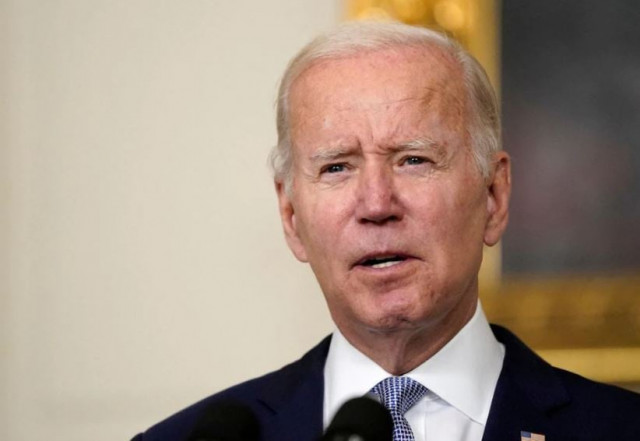World leaders urge restraint after cross-border conflagration
Biden says Pakistan strikes show Iran not ‘well-liked’ in region

Several world leaders urged both Iran and Pakistan to show restraint in the wake of drone strikes inside each other’s territories, with White House warning against any escalation, and the United Nations and the European Union (EU) expressing concerns over the wider impact on the whole region.
Pakistan launched strikes on terrorist hideout inside the Sistan-Baluchestan province of Iran on Thursday, in a retaliatory attack two days after Tehran said it struck the bases of a militant group in the Panjgur district of Balochistan.
US President Joe Biden told reporters at the White House that air strikes by Pakistan and Iran on each other’s territory showed Tehran was not “well-liked in the region”, adding that Washington was now trying to understand how the situation would develop. “I don’t know where that goes,” he said.
White House National Security Council spokesman John Kirby said the United States was monitoring the situation “very, very closely”, adding: “These are two well-armed nations and again we don’t want to see an escalation of any armed conflict in the region, certainly between those two countries.”
Read Pakistan-Iran ties at a crossroads after deadly strikes
Kirby told journalists aboard Air Force One that Washington was in touch with Pakistani officials. “They were struck first by Iran, which was obviously another reckless attack, another example of Iran’s destabilising behaviour in the region,” he added.
Kirby also said that he was “not aware” that Islamabad had notified Washington before striking Iran. He would not comment when asked if the United States would provide support for Pakistan, which is a major non-NATO ally.
The State Department also urged restraint by all sides. State Department spokesperson Matthew Miller said that Pakistan’s statements about the importance of cooperative relations with neighbours were productive and useful.
On Wednesday, Miller had condemned the Iranian strikes inside Pakistan, Iraq and Syria. “So we do condemn those strikes. We’ve seen Iran violate the sovereign borders of three of its neighbours in just the past couple of days,” Miller told his regular media briefing.
“I think it is a little rich for, on one hand, Iran to be the leading funder of terrorism in the region, the leading funder of instability in the region, and on the other hand, claimed that it needs to take these actions to counter terrorism,” Miller added.
Read China urges Iran, Pakistan to 'exercise restraint' after deadly air strike
United Nations Secretary-General Antonio Guterres urged Iran and Pakistan to “exercise maximum restraint to avoid a further escalation of tensions”, his spokesperson Stephane Dujarric said at a media briefing at the UN.
“The Secretary-General underlines that all security concerns between the two countries must be addressed by peaceful means, through dialogue and cooperation, in accordance with the principles of sovereignty, territorial integrity, and good neighbourly relations,” Dujarric said.
In Brussels, EU spokesperson Peter Stano said the continental bloc was deeply worried about the “spiral of violence” in the Middle East and beyond. “These attacks… violate the sovereignty and territorial integrity of countries, and have also a destabilising effect on the region.”
In Kabul, the Taliban foreign ministry called on both Iran and Pakistan to exercise restraint. The ministry, in a statement, stressed that both Tehran and Islamabad should resolve disputed issues through diplomacy and dialogue.



















COMMENTS
Comments are moderated and generally will be posted if they are on-topic and not abusive.
For more information, please see our Comments FAQ